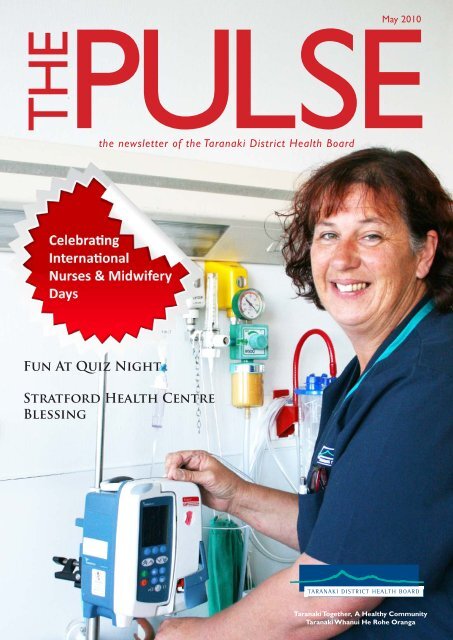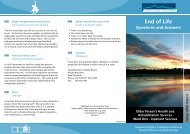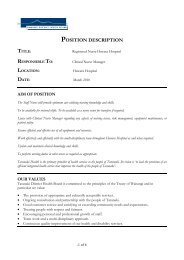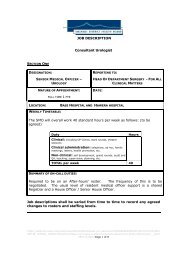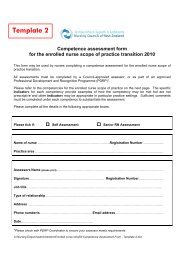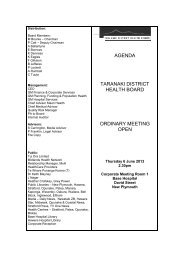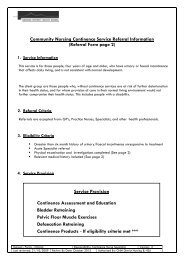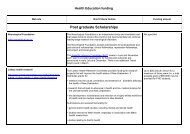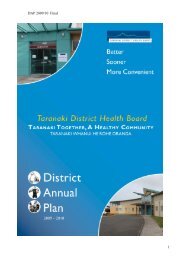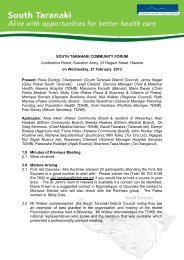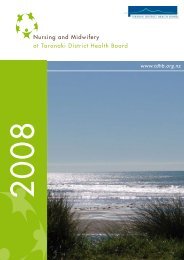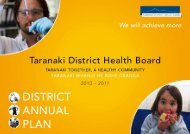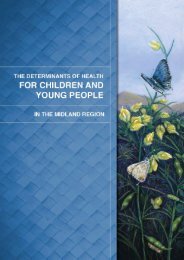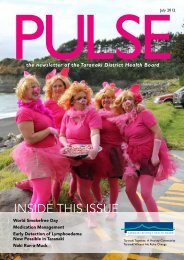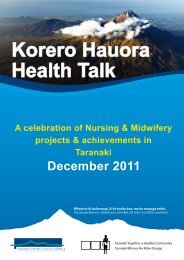to download - Taranaki District Health Board
to download - Taranaki District Health Board
to download - Taranaki District Health Board
Create successful ePaper yourself
Turn your PDF publications into a flip-book with our unique Google optimized e-Paper software.
THEPULSEMay 2010the newsletter of the <strong>Taranaki</strong> <strong>District</strong> <strong>Health</strong> <strong>Board</strong>Fun At Quiz NightStratford <strong>Health</strong> CentreBlessing<strong>Taranaki</strong> Together, A <strong>Health</strong>y Community<strong>Taranaki</strong> Whanui He Rohe Oranga
Comments from CEO Tony Foulkes and Direc<strong>to</strong>r of Nursing Kerry-Ann AdlamTony FoulkesChief ExecutiveKerry-Ann AdlamDirec<strong>to</strong>r of NursingAs can be seen in this edition of ThePulse, our nurses are working in allsettings with all types of patients,organisations and communities.Every country in the world is affected bythe rising tide of chronic disease and theneed for appropriate care, and <strong>Taranaki</strong>is no exception. The potential for nurses<strong>to</strong> contribute <strong>to</strong> improving the health ofpopulations in <strong>Taranaki</strong> and around theworld has never been greater.Statistics show that 60% of deathsglobally are due <strong>to</strong> chronic disease,with 80% of these occurring in lowand middle income countries. OnInternational Nurses’ Day, the Council ofNurses called on nurses everywhere <strong>to</strong>move <strong>to</strong> stem the pandemic of chronicdisease.The Pulse this year reflects the diversityof nursing roles. The Nursing ReconnectProgramme has examples of nurses whoare returning <strong>to</strong> practice in the hospitaland the community with increasedpassion and excitement for their work.This edition also has many examples ofnurses that have continued <strong>to</strong> train anddevelop their skills throughout theircareers.With all the continued education thatnurses are involved in patients continue<strong>to</strong> appreciate the work of our nursesand midwives. The Praise for Nursess<strong>to</strong>ry highlights how the positiveinteraction between nurses and patientsis beneficial <strong>to</strong> recovery.International Nurses Day and theInternational Day of the Midwife giveus the opportunity <strong>to</strong> celebrate bothprofessions each year, acknowledgingthe hard work and commitment <strong>to</strong>patient care. We greatly appreciate thework done by all nurses and midwivesacross <strong>Taranaki</strong>, those in hospitals andin the community, and we thank youfor your contribution <strong>to</strong>wards <strong>Taranaki</strong>Together, a <strong>Health</strong>y Community.Right now there is a midwife helpinga woman become a mum, a nurseholding the hand of a dying man, anurse inserting an IV in a child, a nurselistening <strong>to</strong> an Alzheimer’s patient tell as<strong>to</strong>ry of long ago, a nurse and midwifemissing their family while taking care ofyours . In the minute you <strong>to</strong>ok <strong>to</strong> readthis, nurses all over the world are savinglives.A big thank you <strong>to</strong> the nurses andmidwives working with our communitythroughout <strong>Taranaki</strong>.Kerry-Ann AdlamDirec<strong>to</strong>r of NursingTony FoulkesChief Executive<strong>Board</strong> and Advisory Committee Updates<strong>Board</strong> Update – May• The consolidated financial result <strong>to</strong>date is $2.21m. Our forecast remains at$850,000 worse than planned.• The first stage of Project Maungawill now include the demolition of theStain<strong>to</strong>n block. With pressure on thenational budget it is unlikely we wouldreceive approval for stage two and threein the immediate future.• Two Expressions of Interest that affect<strong>Taranaki</strong> are the National Maori PHOCoalition and the Midland Network. Bothhave been considered by the Ministry of<strong>Health</strong> and business cases are <strong>to</strong> proceed.• Project Splice consultation is completeand recommendations were approved bythe board.Hospital Advisory Meeting – April• The financial deficit forecast hasincreased from $7.1m <strong>to</strong> $8.1m. Therelationships between volume, quality andcost pressures were demonstrated, showinghow the fac<strong>to</strong>rs impacted on each other.• Ambulance Service ownership discussionscontinue with the Ministry of <strong>Health</strong>.• The Emergency Department at Basecontinues <strong>to</strong> be under pressure. Therehas been a 21% increase in triage 4 and 5presentations at Hawera ED in a year.• The Community Oral <strong>Health</strong> Project ismoving ahead and will result in a completechange in the provision of oral healthservices for 0-18 year olds.Community & Public <strong>Health</strong>/ DisabilitySupport Advisory Committees – April• There was a presentation from theDepartment of Conservation on OperationEgmont animal pest control.• Actions by the Disability Action Grouphas resulted in approval for the locationof two bus s<strong>to</strong>ps within Base Hospitalgrounds.• The overall funding position for the ninemonths <strong>to</strong> March was a surplus of $4.4magainst a budgeted surplus of $3.75m.• The Draft National <strong>Health</strong> IT Plan wastabled for discussion. It is looking at howDHBs can work better <strong>to</strong>gether.2// PULSE<strong>Taranaki</strong> Whanui He Rohe OrangaTHE
page 5Contents2. CEO Comments4. A Love of Nursing5. What’s New in Maternity?6. Another Time, Another Pace7. Quiz Night8. Nurses Come Back9. Keeping Safe Overseas10. Expert Shares Knowledge11. Tobacco <strong>Health</strong> Target12. Golf Day Full of Fun13. Blue Coat Brigade14. Kaumatua Day15. Labora<strong>to</strong>ry Costs16. In Briefpage 6page 7page 12page 16EDITORIAL PANELThe Pulse is the newsletter ofthe <strong>Taranaki</strong> <strong>District</strong> <strong>Health</strong><strong>Board</strong>. We welcome your ideasand contributions please submitthem by email <strong>to</strong>:communications@tdhb.org.nzLisa HofsteeTammy TaylorHonor LymburnLisa Hamil<strong>to</strong>nGeraldine JensenFrances PentelowBronwen PepperellFor a full colour version of ThePulse visit:www.tdhb.org.nz;EDITORKrysti Wet<strong>to</strong>nDESIGNERNick O’SullivanPRINTER<strong>Taranaki</strong> DHBPUBLISHERCommunications Team<strong>Taranaki</strong> <strong>District</strong> <strong>Health</strong> <strong>Board</strong>David StreetPrivate Bag 2016New Plymouth 4342<strong>Taranaki</strong> Together, A <strong>Health</strong>y Community PULSE //THE3
Rewarding Career in Mental <strong>Health</strong>John GregoryJohn Gregory made a snap decision<strong>to</strong> become a mental health nurse,leaving a career as a pho<strong>to</strong>grapherbehind him. And he hasn’t regrettedit one bit.It was seeing a TV documentaryfollowed by a visit <strong>to</strong> a mentalhospital that sparked his interest inmental health - the term “mentalhealth” had yet <strong>to</strong> be used.The new TDHB Clinical NurseManager for Te Puna Waiora trainedin the UK in his mid-twenties. Hequalified as a mental health nurseand has worked in the field eversince.He finds working in mental healthinteresting and rewarding. “I enjoytalking <strong>to</strong> the clients and alwayshave.”John came <strong>to</strong> New Zealand fromthe UK in 2000 before heading <strong>to</strong>Australia for a few years. He hasreturned <strong>to</strong> take up the job with theDHB.His role involves helping oversee theinpatient adult mental health unitTe Puna Waiora, the Crisis Team, theAcute Home-based Support Teamand Te Whare Whakaahuru, anacute respite facility.John believes that people sufferingfrom mental health problems shouldbe given as many opportunities aspossible, along with support andunderstanding. “Mental illness canstrike anyone, just like a physicalillness.”Nursing has given him plenty ofopportunities <strong>to</strong> live and work inmany different places, giving himan understanding of how thingsare done elsewhere. “I think NewZealand has got a good mentalhealth service. There’s a committedworkforce and the most talentedbunch of nurses who are prepared<strong>to</strong> go the extra mile.”He is impressed how the staffmembers here support each other.“We’ve got a good team and wediscuss things.”The most important quality mentalhealth nurses need is a desire <strong>to</strong> helpothers <strong>to</strong> get the most from theirlives, John says.A Love of NursingShona Barlow with a pho<strong>to</strong> ofherself early on in her nursingcareer.Shona Barlow was just 15 when shebegan her nurse training.Her mother and three sisters wereall nurses and it was expected shefollow in their footsteps. Shona, arenal district nurse, retired in March.Looking back over her long careershe wouldn’t have had it any otherway. “I loved the challenge, itsuited me beautifully and has beenvery satisfying,” she says.She returned <strong>to</strong> nursing in 1973after leaving <strong>to</strong> have a family. Inthe late 1980s she trained as arenal nurse and was the only onein <strong>Taranaki</strong> for 10 years. She hasknown some of the patients for 30years, and she’s going <strong>to</strong> miss themand her colleagues.In 1997, Pauline Priest beganrelieving so Shona could takeholidays. They’ve worked <strong>to</strong>getherever since.Their role involves training andsupporting pre-dialysis, peri<strong>to</strong>nealdialysis and transplant patients.Peri<strong>to</strong>neal dialysis is a home-basedtreatment for patients with severechronic kidney failure.Shona says the highlight of hercareer was the opening of the RenalUnit in 2001. The number of renalnurses grew <strong>to</strong> six at the time. “Itwas very exciting,” she said.Shona’s husband Ray recentlyretired from his job at Port <strong>Taranaki</strong>as harbourmaster and operationsmanager. Together they haveplenty planned for their retirement.Biking, golf and travelling areamong the long <strong>to</strong>-do list.4// PULSE<strong>Taranaki</strong> Whanui He Rohe OrangaTHE
Another Time, Another PaceTDHB Midwife Robyn Millen spent time volunteering at a Vanuatu hospital. This is her s<strong>to</strong>ry.My husband and youngest sonvisited Vanuatu with a group fromthe Central Baptist Church in 2008<strong>to</strong> build a water tank for a village.They both fell in love with theplace and the people.In 2009, I joined my husband for abrief part of his trip while he didmore voluntary work there.We stayed in a village where mostpeople spoke English. The othertwo official languages are Bislama,which is like pidgin English, andFrench.I went <strong>to</strong> the local hospital just<strong>to</strong> have a look around, but wasso warmly welcomed <strong>to</strong> thematernity unit I decided <strong>to</strong> workthere for a few days. The unit hadan antenatal clinic, labour wardand 16 postnatal beds.At the antenatal clinic, it wasa matter of first in first served.The doors were shut after thefirst 40 women were seen, andthe remainder <strong>to</strong>ld <strong>to</strong> come backanother day.I accompanied a woman, whowas six months pregnant, fromthe village where we stayed <strong>to</strong>the clinic. She had already triedtwice previously <strong>to</strong> get in and itwas difficult <strong>to</strong> convince her <strong>to</strong> tryagain. I explained this was one timewhen “island time” didn’t count.The clinic provided plenty ofinformation on parenting andbirth control, but there are stillhigh rates of teen pregnancies andSTDs.There were educational videosplaying the whole time as manylocals are illiterate because schoolis expensive and not compulsory.Post natal staff had little <strong>to</strong> dowith the mothers as their own“mammas” looked after them,teaching how <strong>to</strong> nappy change,bath and feed the baby. The staffmembers were only called on ifthere were concerns.Most women go home the nextday and only return at two andfour weeks for check ups.Women in labour are assessedevery four hours but otherwisewalk along the corridors,supported by their mamma, untilthey are ready <strong>to</strong> push. They don’tusually have any pain relief.The women bring their own linen,food and drink. One woman Icared for hadn’t had anything<strong>to</strong> eat or drink for 15 hours. Shehad sent her husband home <strong>to</strong>get her something as she wasthirsty. I managed <strong>to</strong> find a cupand give her some water. An hourlater, the woman gave birth <strong>to</strong> ahealthy little baby - amazing.On another occasion, I checkedin on an 18-year-old womanwho had just been cleared <strong>to</strong> gohome with her small, 36 weekold twins which were born threedays earlier. One of the babiesweighed just 2100g and wassleepy, floppy and hadn’t fedmuch since birth. She lookeddehydrated with cracked, dry lips.With a lot of hand signals anda little Bislama, I helped thewoman express milk <strong>to</strong> cup feedthe baby.The baby was like a wiltedflower being watered - withinminutes of drinking the milkshe was responsive enough <strong>to</strong>then breastfeed for 20 minutes. Iwondered if the baby would havesurvived if she had gone homewithout the expressed breastmilk.I learned while I was there howblessed we are in New Zealand<strong>to</strong> have our high standard ofliving and medical care - we can’ttake anything for granted. Eventhough Vanuatu is another timeanother pace, babies are bornand women still survive.6// PULSE<strong>Taranaki</strong> Whanui He Rohe OrangaTHE
TDHB QUIZ NIGHTThis year we celebrated InternationalNurses Day with a quiz night,organised by the Nursing Direc<strong>to</strong>rate.The response <strong>to</strong> the quiz nightwas overwhelming, with 20 teamsrepresenting the DHB, SouthernCross Hospital, WITT, Phoenix UrgentDoc<strong>to</strong>rs, CAREfirst.It was a closely contested quiz andonly three points separated the<strong>to</strong>p three teams. The winning teamwas Twitters (WITT), second wasNeuroleptics (Mental <strong>Health</strong>) andthird was Flaming Phoenix (PhoenixUrgent Doc<strong>to</strong>rs).Many of the teams dressed for theoccasion and made the judging forbest dressed team a challenge. Aftermuch discussion Neo Nerds (NNU) <strong>to</strong>okout first prize with Risqué Business(Quality Risk) second and FrontalLobec<strong>to</strong>mies (Mental <strong>Health</strong>) third.The Nursing Direc<strong>to</strong>rate thanks allthe teams for making it an enjoyableevening, and a reminder that briberydoesn’t work with Glenda unless it isa decent bribe.Also special thanks <strong>to</strong> Kerry, ourobliging orderly, who was theperfect waiter attending tablesduring the evening. And thank you<strong>to</strong> cleaners Helen Cole and ColinNewman who altered their cafécleaning schedule for the evening.spot prizes for innovative answers.For example:What is the term used <strong>to</strong>describe the act of throwing theball in<strong>to</strong> the turf immediatelyafter scoring a <strong>to</strong>uch down inAmerican Rules football?• Show off• ChildishWhy is the White Housewhite?• So the wombles can’t find it• Green houses get <strong>to</strong> hot• PurityWhat is Nyc<strong>to</strong>phobia?• Fear of nursesThe evening was full of surprises • Fear of underwear<strong>Taranaki</strong>with someTogether,teamsA <strong>Health</strong>ybeingCommunityawardedPULSE //THE
Nurses Go Back <strong>to</strong> What they Loveworking in Ward 3 at <strong>Taranaki</strong> BaseHospital.“It’s like adream. It’s whatI wanted <strong>to</strong> doand the nursingreconnect coursegave me theconfidence.”During the nine years Helen wasout of nursing she had stintsowning and running a cafe inWaitara, and as matron at NPGHSScotlands Hostel. She said thecourse was amazing. “It givesyou that ‘you can do it’ feeling.It reaffirms that you do have theskills, you do have the knowledge.Reconnect Coordina<strong>to</strong>r GlendaButturini instilled that confidencein us.”Ward 3 Nurse Helen LeppardFormer nurses are rediscoveringtheir passion working in healthand returning <strong>to</strong> the workforce indroves thanks <strong>to</strong> <strong>Taranaki</strong> DHB’sNursing Reconnect Programme.More than 70 nurses haveundertaken the programme since itstarted in 2007.Two nurses who <strong>to</strong>ok advantageof the programme last year havefound their niche and can’t believetheir good fortune.Delwyn Hous<strong>to</strong>n had been awayfrom nursing for nine years. Afterdiverse experiences from runninga motel and a beauty therapyclinic, she still had nursing in herblood. “It was always in the backof my mind <strong>to</strong> retrain and <strong>Taranaki</strong>DHB offered me the perfec<strong>to</strong>pportunity,” she said.The Nursing Reconnect Programmeis a Nursing Council of NewZealand approved competenceassessment programme forenrolled and registered nurses. Ittakes 6-12 weeks <strong>to</strong> complete andnurses are matched <strong>to</strong> senior nursesfor clinical placements.Delwyn had previous experienceworking in Middlemore Hospital’srehabilitation and surgicalwards. But after completing theprogramme she decided <strong>to</strong> lookat different options and is nowworking at Chalmers Rest Home.“In the rest home I get <strong>to</strong> knowthe residents, listen <strong>to</strong> their s<strong>to</strong>riesand learn about their lives. I feelprivileged,” Delwyn said.Nurse Helen Leppard also successfullycompleted the programme and isShe said working as a nurse againwas scary and she still had <strong>to</strong>check herself. “There is differentequipment and procedures butyour instincts are still the same andpatient’s needs are still the same,”she said.Helen said patients seemed <strong>to</strong> besicker in hospital now as simplehealth problems were dealt with inthe community.“The best change in the wardsis there is much more of a teamapproach between doc<strong>to</strong>rs,pharmacists, specialist nurses andnurses. In the old days a nursewould never speak <strong>to</strong> a consultant– those days have gone and it is amuch better atmosphere,” she said.Both nurses said they enjoyeda change while bringing uptheir families, but the NursingReconnect Programme was thenudge they needed <strong>to</strong> rememberhow passionate they were aboutnursing.8// PULSE<strong>Taranaki</strong> Whanui He Rohe OrangaTHE
Keeping Safe OverseasJody Neville-LambJody Neville-Lamb is combining hernursing background with a love oftravelling <strong>to</strong> help people be safeoverseas.She has completed a PostgraduateCertificate in Travel Medicine andnow runs Carefirst Medical Centre’sTravel Clinic with Dr Alison Gadsby.The clinic offers vaccinations anda wide range of advice on how<strong>to</strong> stay safe and healthy whileoverseas.Praise for NursesJody was a practice nurse atCAREfirst before studying travelmedicine. Most of the people onher course were GPs, with just a fewother nurses.A keen traveller herself, she enjoysfinding out about people’s overseasplans and advising them on whatthey can do <strong>to</strong> keep safe. “It’s reallyinteresting, and I get <strong>to</strong> see peoplewho are doing cool things.”Jody says her own overseasexperiences give her an insight in<strong>to</strong>what people may be in s<strong>to</strong>re for. “Ifyou’re doing travel medicine, it’sreally good <strong>to</strong> travel.”Every country, continent andenvironment is unique and requiresdifferent precautions <strong>to</strong> betaken. Jody needs <strong>to</strong> know exactdestinations, timeframes, activitiesand types of accommodation <strong>to</strong>identify any risks.The consultations, which can lastup <strong>to</strong> an hour, cover everythingfrom vaccines and antimalarials <strong>to</strong>advice on safe sex and credit cardfraud.Medication is prescribed for peoplewho might suffer ailments such asaltitude sickness or s<strong>to</strong>mach bugswhile they’re away.Jody’s travel tips• Always have travel insurance - younever know when you may findyourself in need of urgent medicalattention.• Rabies is 100% fatal if you don’t getmedical treatment. If you’ve been bittenor scratched by an animal seek urgentmedical attention. There’s also a vaccineavailable for rabies.• Watch what you eat and drink inEgypt - 80% of travellers end up withdiarrhoea from the food and waterthere.• Keep pho<strong>to</strong>copies of your passport ina safe place, it’ll make the applicationprocess <strong>to</strong> get a new one a lot easier ifyou lose the original.• If you return from a malariaaffected country with a temperatureseek medical attention early andtell your health professional whereyou’ve been.• Protect yourself from malariamosqui<strong>to</strong>es at night, that’s when theyfeed. Dengue mosqui<strong>to</strong>es bite during theday.• If you think you need vaccinesbefore you travel, arrange this early.Some vaccines require a series ofinjections. Yellow fever vaccine iscompulsory for entry in<strong>to</strong> manycountries throughout South Americaand Africa.• Make sure someone knows where youare at all times.Here are just of a few of thecomments made by patientsthanking nurses for the care theyprovide. The comments are fromthe Patient Satisfaction Surveys.“The ward nurses were great -went out of their way <strong>to</strong> ensurecomfort and kept me up-<strong>to</strong>-date onhappenings.” (Ward 2)“Impressed by the nurses’ expertiseand attention at all times.” (Ward 4)“Night nurse excellent.” (Ward 3)“Male nurse was excellent - kind,quiet and efficient when I felt sodreadful.” (ED)“Most staff treated me as if I waspersonally important <strong>to</strong> them - notjust a patient.” (Ward 5)“Impressed by the way nurses caredfor a very difficult patient in myroom.” (Ward 4)“The WITT trainees were excellent,very pleasant and helpful. The HCAsvery friendly and helpful.” (Ward 4)“The ED nurse was lovely, had agood sense of humour and I reallyappreciated his care.” (ED)“Helpfulness of nursing and medicalstaff made me feel so safe and wellcared for.” (Ward 5)“Wonderful discharge informationgiven <strong>to</strong> me as mum’s carer - such ahelp.” (Day Ward)“Midwives were fantastic,beautiful, caring people. Thankyou for making my experience sowonderful.” (Maternity)“Helpfulness of all neonate nursesamazing. Came home feelingconfident thanks <strong>to</strong> wonderfulteam.” (Maternity)<strong>Taranaki</strong> Together, A <strong>Health</strong>y Community PULSE //THE9
Expert Shares KnowledgeDr Michael BirdCaring for people with dementiacan be rewarding and challenging– especially when behaviouralproblems appear.Finding the causes of behaviouralproblems can be particularlydifficult but is a vital key <strong>to</strong>maintaining quality care, says anexpert in the field.Dr Michael Bird was in NewZealand <strong>to</strong> run a workshop at thePsychology of Older Age meetingin Auckland in April. He also spenttwo days in <strong>Taranaki</strong>, where he gavepresentations on the behaviouraland psychological symp<strong>to</strong>ms ofdementia.Dr Bird is a consultant (senior)clinical psychologist for olderpeople in Australia. He is currentlythe Direc<strong>to</strong>r of the Aged CareEvaluation Unit in Canberra. He hasa special interest in dementia andassociated problems such as anxietyand depression.He said behaviours associatedwith dementia include repetitivequestions, screaming, violence,resistance <strong>to</strong> care and wandering.Finding the cause of the problemhelps determine which treatmentis most suitable for each client, hesays. “Talking <strong>to</strong> families helps geta picture of how the person used<strong>to</strong> be.” For example someone whowas a shift worker may find itdifficult sleeping at night when ina rest home.Dr Bird says anti-psychoticmedication isn’t always theanswer. A common senseapproach, such as talking quietly<strong>to</strong> a distressed client, reassuringthem or giving them spacecould be a better alternative. It’simportant that staff looking afterdementia sufferers take a lead incoming up with interventions, headded.He said working with people withdementia can be stressful. “Thereare some amazingly dedicatedpeople out there.”TDHB Clinical Psychologist JohnGlass and Aged ResidentialCare Nurse Consultant BronwenPepperell organised for Dr Bird <strong>to</strong>come <strong>to</strong> <strong>Taranaki</strong>. The workshopswere a big hit with the DHB andrest home staff who attended.Manager Heads <strong>to</strong> AustraliaPaula HakesleyPaula Hakesley has left her job asMental <strong>Health</strong> Service Manager for anew role across the ditch.She said she had spent five fabulousyears at the DHB. “The staff arefantastic and the services are great.”She especially liked working onprojects that raised the Mental<strong>Health</strong> Service’s profile locally andnationally. “I have a passion for jointventures and working with the NGOsec<strong>to</strong>r.”Paula thanked the DHB forsupporting her <strong>to</strong> growprofessionally. “The DHB providesgood grounds for people <strong>to</strong> getexperience and take on newchallenges.”Her colleagues were sad <strong>to</strong> seeher go, and paid tribute <strong>to</strong> thecontribution she had made <strong>to</strong> themental health sec<strong>to</strong>r in <strong>Taranaki</strong>.“I’ve just loved working with Paula,”Hospital Services General ManagerJoy Farley said. “She is practical,sensible and got on with the job. Forthat, we’ll always be grateful.”Several people, representing a rangeof departments and organisations,spoke at Paula’s farewell held inBarretts Lounge.Mental <strong>Health</strong> Clinical Direc<strong>to</strong>r DrSamir Heble said he had enjoyedworking with Paula, and creditedher for strengthening networks in<strong>Taranaki</strong>.10// PULSE<strong>Taranaki</strong> Whanui He Rohe OrangaTHE
Elephant Represents an Obvious TruthThere’s an elephant in the room andit’s <strong>to</strong>o big <strong>to</strong> ignore - smoking.Smoking is a serious addiction. Morethan half of all smokers can’t quitwithout help and about half ofeveryone who smokes dies from asmoking-related disease. On average,smokers lose 15 years of their lives.Hospitalisation provides a goodopportunity <strong>to</strong> initiate and support aquit attempt, not only for patients butalso parents and other whanauof hospitalised children and youngpeople.The ABC approach for smokingcessation is based on the New ZealandSmoking Cessation Guidelines, whichprompts and provides support forall health workers <strong>to</strong> Ask all patientsif they smoke, give Brief advice <strong>to</strong>quit <strong>to</strong> all smokers and <strong>to</strong> provideevidence-based Cessation support.The average smoker can take about 14attempts before quitting successfullylong term. <strong>Health</strong> professionals havea duty of care and play an importantrole in helping smokers <strong>to</strong> quit.The key is <strong>to</strong> encourage and supportanother quit attempt as soon aspossible.One of the Government’s new healthtargets is Better Help for Smokers<strong>to</strong> Quit. The target is for 80% ofhospitalised smokers <strong>to</strong> be providedwith advice and help <strong>to</strong> quit by July2010.To help clinical staff document thiswe have introduced a simple tick boxSmoking Cessation/Referral Form:; http://tdhbintranet/Forms/Clinical/All medical and nursing staff arerequired <strong>to</strong> complete the form forevery patient admitted <strong>to</strong> hospital,including those staying in ED longerthan three hours.Mā te rongo, kamōhioMā te mōhio, kamāramaMā te mārama, kamātauMā te mātau, ka oraThrough resonancecomes cognisance;Through cognisancecomes understanding;Through understandingcomes knowledge;Through knowledgecomes life and wellbeingStratford <strong>Health</strong> Centre BlessingA blessing of the Stratford <strong>Health</strong>Centre site was held in April, beforethe building work started.Members of the Stratford <strong>Health</strong>Trust, along with representativesfrom <strong>Taranaki</strong> DHB, Stratford <strong>District</strong>Council and the WhakaahurangiMarae <strong>to</strong>ok part in the blessing.The Stratford <strong>Health</strong> Trust hascompleted a tender process withFletcher Construction being awardedthe contract. Construction has begun<strong>to</strong> develop the facilities on theexisting Stratford <strong>Health</strong> Centre site.The expanded health centre willaccommodate general practice,physiotherapy, community midwifery,audiology services and current DHBservices.Due <strong>to</strong> the impacts of noise anddisturbance on some patients,alternative rooms have been foundat 88 Miranda St for the clinicalservices most affected.The blessing ceremony at the Stratford <strong>Health</strong> Centre.However, DHB funded physiotherapyoutpatients will have the choice ofreceiving treatment at the StratfordPhysiotherapy Clinic, 88 Celia St,or at Base or Hawera HospitalPhysiotherapy Departments.ACC clients who meet <strong>Taranaki</strong>DHB entry criteria for outpatientphysiotherapy are able <strong>to</strong> receive thistreatment at Base or Hawera Hospitalat no cost. Patients also have theoption <strong>to</strong> receive treatment privatelyin Stratford, or elsewhere, and pay aco-payment.The aim is <strong>to</strong> establish a communitycentered health service offeringan extensive range of primary andsecondary health services from asingle location for the people ofStratford.<strong>Taranaki</strong> Together, A <strong>Health</strong>y Community PULSE //THE11
Golf Day Full of FunThe <strong>Taranaki</strong> DHB annual golf<strong>to</strong>urnament was a big hit with staff.Participants were treated <strong>to</strong> awonderful sunny day and fantasticviews of the mountain as they played.The golf was pretty good also withcompetitive scores posted.Congratulations <strong>to</strong> the winners:Supreme Award for Best OverallTeamEquinus Contracture (Orthopaedics/Theatre)2nd Best Overall teamBusy Hands (Physio)3rd Best Overall TeamHIQ Hackers (IT)Best Dressed TeamThe DisorderliesMen’s Longest DriveColin ShotterWomen’s Longest DriveFiona TaylorMen’s Closest <strong>to</strong> the PinChris HenwoodWomen’s Closest <strong>to</strong> the PinVal YoungPlayers were given a starterpack containing goodies beforeembarking on a round of golf, withBBQ sausages and refreshments onthe way. Everyone won a prize, andthis year some got more than one.The <strong>to</strong>urnament and prizes couldnot happen without the generoussupport of our sponsors, which areacknowledged on:;http://www.tdhb.org.nz/news/latest_news.shtml12// PULSE<strong>Taranaki</strong> Whanui He Rohe OrangaTHE
Clinical <strong>Board</strong>Planning and Funding ClinicalLeadership GroupPlanning, Funding and PopulationGM Sandra <strong>Board</strong>man providedinformation and answered questionsabout the role and current activityof this group, which is an advisorygroup <strong>to</strong> Planning and Fundingmade up of hospital and communityclinicians.The group is working alongside theClinical <strong>Board</strong> with a specific focuson funding.The group is currently looking at threeprojects:• Reducing community pharmacyexpenditure• Interface between primaryand secondary sec<strong>to</strong>rs aroundosteoarthritis and joint replacement• Urgent but non emergency access <strong>to</strong>services after hoursVagal Nerve StimulationTherapyThe Clinical <strong>Board</strong> approved <strong>to</strong>take part in a pilot project thatwill establish the viability of thisas a treatment modality for severeintractable epilepsy, where epilepsysurgery is not an option.Clinical Ethics Advisory GroupThe establishment of a clinicalethics advisory group is supportedunanimously by the Clinical <strong>Board</strong>.Dr Gail Riccitelli, Psychiatrist, willbe the group champion for theDHB. The next step is <strong>to</strong> requestexpressions of interest from allclinical staff <strong>to</strong> develop a coregroup for this project.If you are interested in being par<strong>to</strong>f the group please contact GailRiccitelli (Gail.Riccitelli@tdhb.org.nz,ext 8572) or Honor Lymburn (Honor.Lymburn@tdhb.org.nz, ext 8982).Blue Coat Brigade BlossomsInfection Control Committee -Annual Report 2009This report highlighted the increasedflu vaccine uptake and reducedstream infection in renal patients.The committee is always looking forinterested staff <strong>to</strong> play a role.CommunicationA synopsis of the Clinical <strong>Board</strong>minutes from each meeting willgo on the intranet. The Clinical<strong>Board</strong> intranet page will haveinformation including details fromthe Dashboard of Clinical Indica<strong>to</strong>rs.;http://tdhbintranet/AboutUs/Clinical+<strong>Board</strong>/Next MeetingThe next Clinical <strong>Board</strong> meeting willbe held on Thursday, 27 May 2010.Blue Coats are gracing our corridorsin force, sending lost looking visi<strong>to</strong>rs,staff and patients off in the rightdirection.The number of meet and greetvolunteers, who are distinctive intheir bright blue coats, has grown <strong>to</strong>23.The concept started with just oneperson, but a recent call out for morevolunteers resulted in a flood of calls<strong>to</strong> Volunteering New Plymouth.The volunteers received training andwere given a comprehensive <strong>to</strong>ur ofBase Hospital in preparation for theirduties.TDHB’s Robyn Harvey (far right) with some of the newly recruited meet andgreet volunteers.Blue Coat Supervisor Lyn Kretschmarorganises the roster, which is splitin<strong>to</strong> morning and afternoon shifts.The meet and greet volunteersare based at main reception andcorporate reception.Robyn Harvey, of Human Resources,says the Blue Coats come from arange of backgrounds.From young mothers <strong>to</strong> retirees,they’re all keen <strong>to</strong> help out. “Wereally appreciate it.”The service is in its infancy and thereare plans <strong>to</strong> grow it in the future.A special thanks <strong>to</strong> La NuovaDrycleaners for supporting theinitiative.<strong>Taranaki</strong> Together, A <strong>Health</strong>y Community PULSE //THE13
Kaumatua DayThis year’s Kaumatua Wellbeing Dayat Waitara was again a great success,attracting more than 150 older peoplefrom as far away as Parihaka and Patea.The annual event was one of a seriesof Wellbeing Days organised by NewPlymouth injury Safe, in partnershipOn Alert<strong>Taranaki</strong> DHB <strong>to</strong>ok part in a recent<strong>Taranaki</strong> Civil Defence EmergencyManagement exercise <strong>to</strong> test responseplans in the event of a tsunami threat.It was a table <strong>to</strong>p exercise, using arealistic scenario based on the 2009Samoan earthquake. The exercisefocussed on the functions andrelationships within the Emergencywith Mahia Mai A Whai Tara, <strong>to</strong> raiseawareness of health and wellbeingissues among Kaumatua in <strong>Taranaki</strong>.The Kaumatua Wellbeing Day was heldin April at Owae Marae and promotedactivities such as dancing, waiata,raranga (weaving), Tai Chi, mirimiriOperations Centre at the <strong>Taranaki</strong>Emergency Management Office.Several organisations were representedin the various roles, including TDHBEmergency Management Coordina<strong>to</strong>rMike Broker as <strong>Health</strong> Liaison, andCommunications Advisor Krysti Wet<strong>to</strong>nin the Public Information ManagementTeam.(massage), free health checks and theopportunity <strong>to</strong> have a free flu jab.More than 20 organisations, includingthe DHB, were represented on theday, providing information <strong>to</strong> raiseawareness of health, wellbeing andsafety issues.Mike found the day useful and says healthis now well recognised and integratedin<strong>to</strong> <strong>Taranaki</strong>’s Civil Defence EmergencyManagement planning, response andrecovery. “It was great <strong>to</strong> see continuedimprovement in the function of theEmergency Operations Centre as a resul<strong>to</strong>f the ongoing training and exercises wehave been involved in.”The most interesting part of the dayfor Mike was seeing the New Plymouth<strong>District</strong> Council’s geographic informationsystem for modelling the probable tsunamiwave surge inland along our coast. Itidentified high-risk areas and populations,allowing relevant warnings and resources<strong>to</strong> be focussed in the right places.Coming up in Oc<strong>to</strong>ber will be anational tsunami exercise, involving allGovernment departments. <strong>Taranaki</strong> DHBwill take part in some capacity and Mikewill be in <strong>to</strong>uch with the relevant peoplewith more details.14// PULSE<strong>Taranaki</strong> Whanui He Rohe OrangaTHE
Labora<strong>to</strong>ryCosts• Did you know that full blood count tests cost the DHB on average $42,725 amonth? That’s for 3712 tests.• For the 3804 urea tests taken on average each month the cost is $12,667.• It costs $26,586.00 for 3798 tests for electrolytes, and $5,064 for 1521 glucosetests.• To carry out 1509 liver function tests a month the cost is $32,066.Here are some more interesting figures, taken as an average over a month.Test Number Total CostCoag screen464 $9,242Troponin TCRPUrineBlood gasBlood group and holdBlood culture1161 $15,9172071 $13,399783 $13,624352 $7,634403 $6,443224 $6,435<strong>Taranaki</strong> Together, A <strong>Health</strong>y Community PULSE //THE15
In Brief<strong>Health</strong> Education ResourcesThe new catalogue of the Ministry of <strong>Health</strong>’s free health education resources is now available and has been distributed<strong>to</strong> TDHB departments and external organisations. To view and order MoH <strong>Health</strong> Education Resources online go <strong>to</strong>:;www.healthed.govt.nzThe resources are available <strong>to</strong> order from the Public <strong>Health</strong> Unit’s Resource Room at no charge. To order, visit theResource Room Public <strong>Health</strong> Unit or email resource.room@tdhb.org.nz. Along with the many Ministry of <strong>Health</strong>resources the centre also s<strong>to</strong>cks material from other organisations.An Essential DonationThe <strong>Taranaki</strong> Masonic Lodge’s Ladies Committee has donatedhundreds of <strong>to</strong>iletry packs for our patients over the last 10years. The committee members buy essential items such as<strong>to</strong>othbrushes, <strong>to</strong>othpaste, combs, pens and tissues and put themin<strong>to</strong> packs for patients who suddenly find themselves admitted<strong>to</strong> Base or Hawera hospitals.Hospital Operations Manager Steve Berendsen said the packswere much appreciated by patients. Pictured are committeemembers Rosemary Harvie, Lorraine Yateman and MargaretThompson with DHB staff Jenny Mackrell, Steve Berendsen,Raechel Goodhue, Janet Gibson and Sue Williamson.Dental Therapist RetiresThe School Dental Service recently celebrated the retirement ofDental Therapist Jacqui Wickham at the Nice Hotel.Pho<strong>to</strong>graphed is Jacqui (centre) with colleagues LoisHarrop, from Stratford, and Sue Armstrong who came fromWhangamata for the occasion. Jacqui, Lois and Sue previouslyworked <strong>to</strong>gether at the Inglewood School Dental Clinic andwere known as the “Inglewood Trifecta”.ED Farewells FriendThe ED team gave Receptionist Michelle Ruakere a send offshe won’t forget in a hurry. Sad <strong>to</strong> see her going, they <strong>to</strong>ok herhostage in an attempt <strong>to</strong> persuade her <strong>to</strong> stay. Michelle is moving<strong>to</strong> Australia, after working at the DHB for 21 years.16// PULSE<strong>Taranaki</strong> Whanui He Rohe OrangaTHEThe Pulse - <strong>Taranaki</strong> <strong>District</strong> <strong>Health</strong> <strong>Board</strong>Private Bag 2016, New Plymouth 4342


